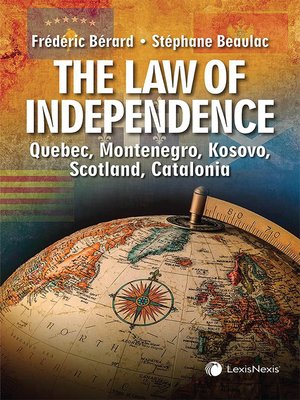
Sign up to save your library
With an OverDrive account, you can save your favorite libraries for at-a-glance information about availability. Find out more about OverDrive accounts.
Find this title in Libby, the library reading app by OverDrive.



Search for a digital library with this title
Title found at these libraries:
| Library Name | Distance |
|---|---|
| Loading... |
In August 1998, the Supreme Court of Canada handed down one of the most important decisions in recent history: Reference re Secession of Quebec. … The 1998 Reference is most significant because, for the very first time in modern history, a national court considered the tough question of the legal characterization of secession by a federated unit (a province) within a democratic state.
So begins the introduction to this new volume, The Law of Independence, by leading academics and lawyers Frédéric Bérard and Stéphane Beaulac. As they explain, Reference re Secession of Quebec is a landmark judgment regarding the legality, under both Canadian and international law, of a unilateral secession of Quebec from Canada and their text offers a theoretical and pragmatic analysis of the different aspects of the Supreme Court of Canada's decision, including the background and context leading up to the opinion. A comparative study of the nationalist movements and/or referenda in Montenegro, Kosovo, Scotland and Catalonia is also conducted, with a view to shedding light onto the law of independence.
Comprehensive content
The Law of Independence succinctly summarizes and analyzes the seminal 1998 opinion as well as the international influence of the case on other jurisdictions. Written in a clear and easy-to-understand manner, this authoritative text:







